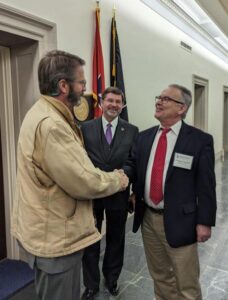 Philippe Fauchet, Bruce and Bridgitt Evans Dean of the School of Engineering, recently met with members of Tennessee's congressional delegation to emphasize the integral role federally funded research plays in strengthening United States competitiveness and security.
Philippe Fauchet, Bruce and Bridgitt Evans Dean of the School of Engineering, recently met with members of Tennessee's congressional delegation to emphasize the integral role federally funded research plays in strengthening United States competitiveness and security.
During meetings organized by Vanderbilt's Office of Federal Relations, Fauchet and representatives from Tennessee State University, the University of Tennessee-Knoxville, the University of Memphis, and Tennessee Tech University highlighted the key role their universities have in the economic growth of the state, region, and nation — from educating the engineering workforce to developing the innovations that will fuel this growth. They emphasized the need to foster a stronger STEM workforce of both domestic and international talent to ensure continued U.S. leadership.
Specifically, Fauchet drew attention to a few innovative projects Vanderbilt has been a part of recently, including the university’s selection as the lead institution for NSF’s new Mid-South Innovation Corps Hub, which will provide training to academic researchers across all science and engineering fields and is expected to help the region maximize its innovation potential.
Vanderbilt researchers’ are also partnering with the 101 st Airborne Division at Fort Campbell to design a groundbreaking exoskeleton with the power to release stress on soldiers’ backs.
And, through a consortium of other universities, Vanderbilt partnered with Nissan North America, Toyota, General Motors, and the Tennessee Department of Transportation to test 100 AI-equipped vehicles last November in an effort to reduce human-caused traffic jams.
"I welcomed the opportunity to tell the story of the productive partnerships Vanderbilt's School of Engineering — and our peer institutions across the state — has with numerous federal agencies to support vital research in areas ranging from health care and defense to energy and entrepreneurship," said Fauchet. "My colleagues and I also delivered positive news about the healthy outlook for educating and training a new generation of innovative, solutions-oriented STEM leaders at all levels of higher education."
Fauchet was in DC as part of the American Society of Engineering Education’s Public Policy Colloquium, which brings together engineering deans from across the country. Their key message was for Congress to continue funding federal agencies that support engineering education and research, such as the National Science Foundation and the Departments of Defense and Energy.